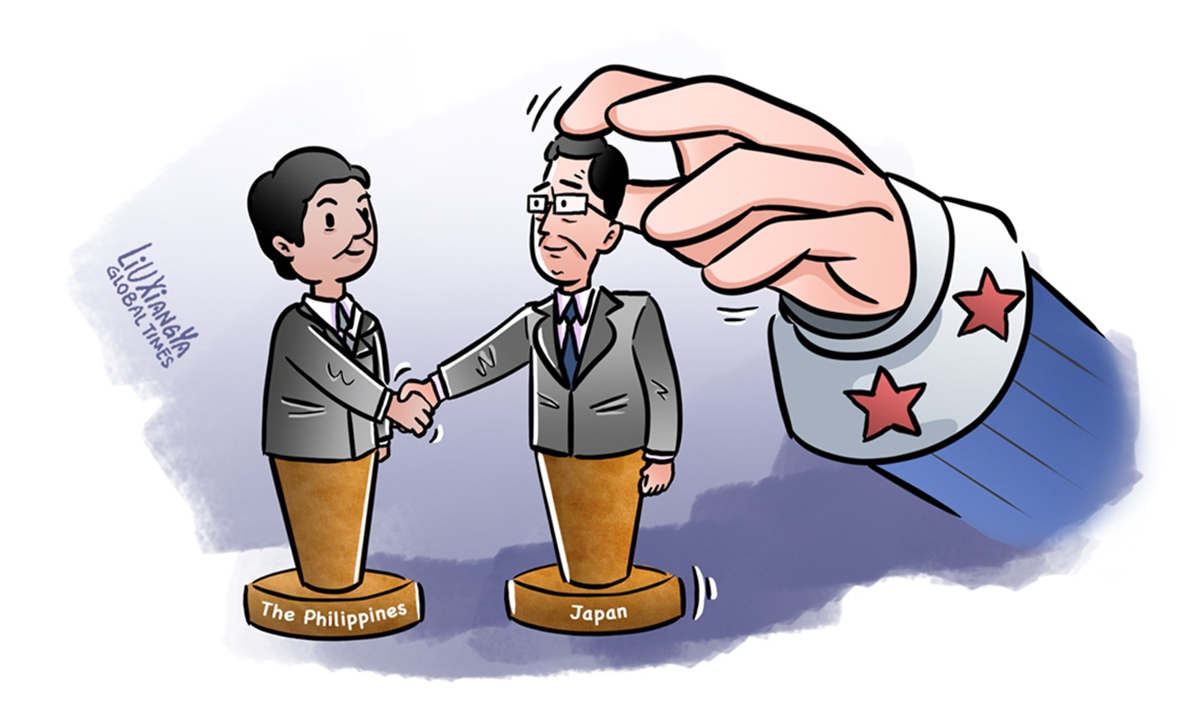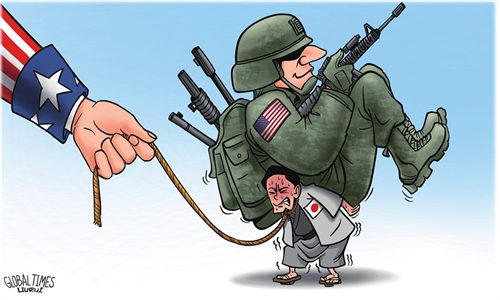US-Japan-Philippines minilateral group unstable, fosters conflict and confrontation

Illustration: Liu Xiangya/GT
On Thursday, US President Joe Biden, Japanese Prime Minister Fumio Kishida and Philippine President Ferdinand R. Marcos Jr. will hold a trilateral summit in the US, the first among the three countries' leaders. Beneath the active pursuit of "cooperation," "peace" and "security," an undercurrent of confrontation, danger and conflict flows.
The relationships among the US, Japan, and the Philippines are intricately complex and exhibit a distinct hierarchical structure.
As the most powerful country among the three, the US plays the role of the "leader," intending to elevate the bilateral alliance with Japan into an exclusive minilateral group, constructing a military chain for its "Indo-Pacific Strategy" to consolidate its regional hegemony and contain China's influence.
Japan, as the primary ally of the US in East Asia, acts as an active "collaborator." It seeks to leverage the strategic tensions between China and the US, breaking free from post-war constitutional constraints and its exclusively defense-oriented policy, as well as establishing a multilateral coalition to militarily deter China along its coastlines.
The Philippines, the weakest among the three, is merely a unilateral "subordinate," hoping to gain the trust of the US and Japan by aligning with their strategic needs, in order to receive comprehensive political, diplomatic, and military support from both countries.
However, in reality, the Philippines is merely being used as a tool by the US and Japan, Liu Jiangyong, vice dean of the Institute of Modern International Relations at Tsinghua University, told the Global Times. The two countries are attempting to exploit the contradictions between the Marcos Jr. administration and China in the South China Sea to further expand their alliances in East Asia, especially establishing a mutually supportive network in the South China Sea and East China Sea. The ultimate goal is to lock down the Taiwan Straits, thus disrupting and impeding China's peaceful reunification, said Liu.
While the ambitions of the US, Japan, and the Philippines may seem well-calculated, this so-called trilateral cooperation, in fact, faces the imminent risk of falling apart.
On one hand, while the US is currently in an election year, Japan will also hold general elections next year. Once the administrations change, there is no guarantee the new leaders will continue this trilateral cooperation. In fact they may even reverse course.
On the other hand, the cooperation with the US does not resonate well with the people of Japan and the Philippines. In Japan, on Tuesday, rallies and protests were held against the government's expansion of military power. Besides, the Philippines' increasing reliance on the US and exacerbating tensions in the South China Sea have also caused anxiety among Filipinos. Senator Imee Marcos, sister of Marcos Jr., stated that her brother's actions are leading the country down a "dangerous path."
Furthermore, another uncertainty lies in the reactions of regional countries toward the US-Japan-Philippines cooperation, Sun Xihui, an associate research fellow with the National Institute of International Strategy at the Chinese Academy of Social Sciences, told the Global Times. If the oppositions from other countries in the region against the destabilizing effects caused by the US-Japan-Philippines cooperation continue to grow, it will also to some extent affect the direction and degrees of the trilateral cooperation.
Among the issues of common concern to the US, Japan, and the Philippines, the South China Sea issue is one of the most closely watched by the world. Philippine President Marcos said on Wednesday that the upcoming trilateral summit will include an agreement to maintain security and freedom of navigation in the South China Sea.
However, it is clear who is undermining the security of the region. Countries outside the region, led by the US, have been cobbling together small groupings in the South China Sea. They have been stoking confrontation in the name of cooperation, flexing muscles in the name of peace, and sowing chaos in the name of order. This is no doubt an act of hegemonism. The US, Australia, the Philippines and Japan just completed joint military exercises last week. On Tuesday, US National Security Advisor Jake Sullivan said more joint patrols are expected in the South China Sea. All these undoubtedly will further exacerbate tensions in the South China Sea. How can these countries have the audacity to claim to promote "security" and "peace"?
Several foreign media outlets warned that the South China Sea could become the world's next flashpoint. The main culprit for the unrest in the South China Sea is the US and its allies' repeated and escalating provocations, Wang Guangtao, an associate research fellow with the Center for Japanese Studies at the Shanghai-based Fudan University, told the Global Times. The US repeatedly attempts to reverse black and white through cognitive warfare, attributing the risks and conflicts in the South China Sea to China, ignoring China's consistent and open policy stance of dialogue with relevant countries on South China Sea issues. As external forces, the US and Japan purportedly express the so-called concern about the South China Sea, but their real intentions are already an open secret.

